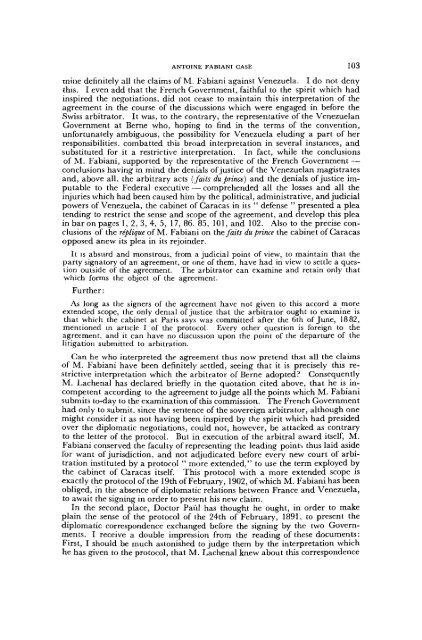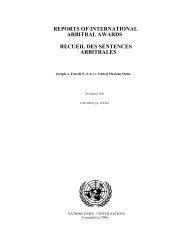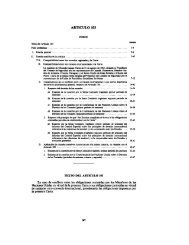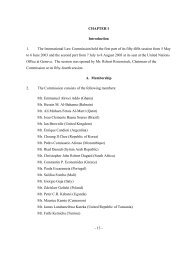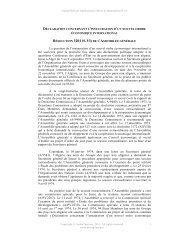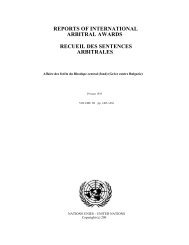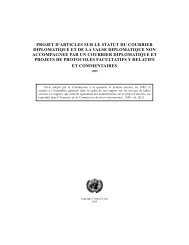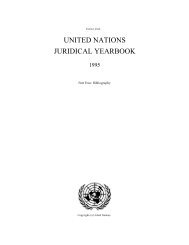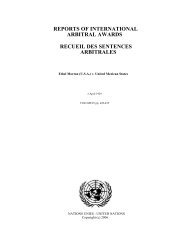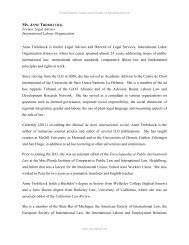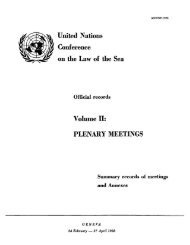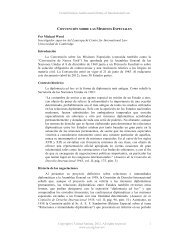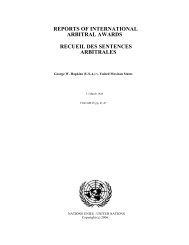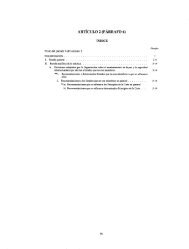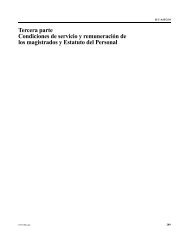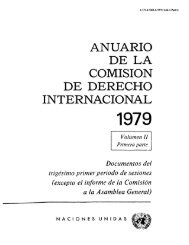Antoine Fabiani Case - United Nations Treaty Collection
Antoine Fabiani Case - United Nations Treaty Collection
Antoine Fabiani Case - United Nations Treaty Collection
Create successful ePaper yourself
Turn your PDF publications into a flip-book with our unique Google optimized e-Paper software.
ANTOINE FABIANI CASE 103<br />
mine definitely all the claims of M. <strong>Fabiani</strong> against Venezuela. I do not deny<br />
this. I even add that the French Government, faithful to the spirit which had<br />
inspired the negotiations, did not cease to maintain this interpretation of the<br />
agreement in the course of the discussions which were engaged in before the<br />
Swiss arbitrator. It was, to the contrary, the representative of the Venezuelan<br />
Government at Berne who, hoping to find in the terms of the convention,<br />
unfortunately ambiguous, the possibility for Venezuela eluding a part of her<br />
responsibilities, combatted this broad interpretation in several instances, and<br />
substituted for it a restrictive interpretation. In fact, while the conclusions<br />
of M. <strong>Fabiani</strong>, supported by the representative of the French Government —<br />
conclusions having in mind the denials of justice of the Venezuelan magistrates<br />
and, above all, the arbitrary acts (faits du prince) and the denials of justice imputable<br />
to the Federal executive — comprehended all the losses and all the<br />
injuries which had been caused him by the political, administrative, and judicial<br />
powers of Venezuela, the cabinet of Caracas in its " defense " presented a plea<br />
tending to restrict the sense and scope of the agreement, and develop this plea<br />
in bar on pages 1, 2, 3, 4, 5, 17, 86. 85, 101, and 102. Also to the precise conclusions<br />
of the réplique of M. <strong>Fabiani</strong> on Ù\s faits du prince the cabinet of Caracas<br />
opposed anew its plea in its rejoinder.<br />
It is absurd and monstrous, from a judicial point of view, to maintain that the<br />
party signatory of an agreement, or one of them, have had in view to settle a question<br />
outside of the agreement. The arbitrator can examine and retain only that<br />
which forms the object of the agreement.<br />
Further:<br />
As long as the signers of the agreement have not given to this accord a more<br />
extended scope, the only denial of justice that the arbitrator ought to examine is<br />
that which the cabinet at Paris says was committed after the 6th of June, 1882,<br />
mentioned in article I of the protocol. Every other question is foreign to the<br />
agreement, and it can have no discussion upon the point of the departure of the<br />
litigation submitted to arbitration.<br />
Can he who interpreted the agreement thus now pretend that all the claims<br />
of M. <strong>Fabiani</strong> have been definitely settled, seeing that it is precisely this restrictive<br />
interpretation which the arbitrator of Berne adopted? Consequently<br />
M. Lachenal has declared briefly in the quotation cited above, that he is incompetent<br />
according to the agreement to judge all the points which M. <strong>Fabiani</strong><br />
submits to-day to the examination of this commission. The French Government<br />
had only to submit, since the sentence of the sovereign arbitrator, although one<br />
might consider it as not having been inspired by the spirit which had presided<br />
over the diplomatic negotiations, could not, however, be attacked as contrary<br />
to the letter of the protocol. But in execution of the arbitral award itself, M.<br />
<strong>Fabiani</strong> conserved the faculty of representing the leading points thus laid aside<br />
for want of jurisdiction, and not adjudicated before every new court of arbitration<br />
instituted by a protocol " more extended," to use the term exployed by<br />
the cabinet of Caracas itself. This protocol with a more extended scope is<br />
exactly the protocol of the 19th of February, 1902, of which M. <strong>Fabiani</strong> has been<br />
obliged, in the absence of diplomatic relations between France and Venezuela,<br />
to await the signing in order to present his new claim.<br />
In the second place, Doctor Paul has thought he ought, in order to make<br />
plain the sense of the protocol of the 24th of February, 1891, to present the<br />
diplomatic correspondence exchanged before the signing by the two Governments.<br />
I receive a double impression from the reading of these documents:<br />
First, I should be much astonished to judge them by the interpretation which<br />
he has given to the protocol, that M. Lachenal knew about this correspondence


